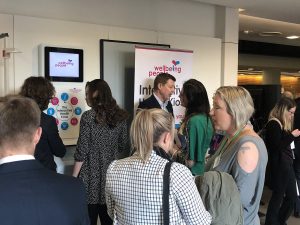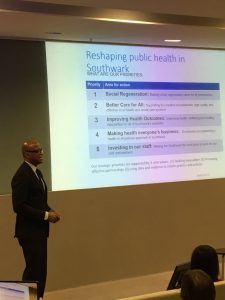Recap from The Wellbeing Symposium 2019
In April 2019, the annual Wellbeing Symposium made its London debut at the central London offices of Deloitte UK. The event was organised by C3, Wellbeing People and Pillory Barn, with sponsorship from Golding Homes and MAXIMUS. A high-calibre speaker line-up, workshops and networking opportunities allowed for an interactive and informative experience for participants from businesses, academia and the third sector looking to take action in the realm of prevention and wellbeing. C3’s own Christine Hancock gave the welcoming address in which she emphasised the high economic cost of low levels of wellbeing, and the widening health inequality gap between the poorest and richest people in our communities.

Dr Paul Litchfield, Chair of the What Works Centre for Wellbeing discussed how the effects of digitalisation and technology have forced innovation and productivity to come first and foremost in our lives, while work quality and wellbeing have experienced a steep decline. He referred to this issue as the productivity gap paradox, citing statistics that show that while UK employment rates are close to an all-time high, UK productivity is flatlining and falling behind competitors – there is plenty of work being done, but not necessarily good work. He claimed that work quality is the key to wellbeing, and the evidence for the benefits of wellbeing is growing. There is a 10 per cent productivity increase when employers focus on wellbeing – when you focus on wellbeing, you get more good work out of people. Dr Litchfield described the many benefits of wellbeing initiatives in the workplace and stressed that these must go beyond the simply transactional (such as offering free gym memberships to employees), but that wellbeing must be addressed holistically; a key theme throughout the Symposium.
Rebecca George OBE, Vice Chair and UK Public Sector Leader at Deloitte, explained Deloitte’s efforts to create a culture of opportunity and growth centred around wellbeing. Deloitte has made it a priority to enable their employees to talk about their mental health struggles in a safe environment, as well as train employers on how to respond and help. Rebecca discussed the financial and business advantages of supporting wellbeing in the workplace, citing an estimated £141m total absence and presenteeism cost lost by the firm in 2016/2017 due to absence or people’s loss of productivity when ‘sick at work,’ and also cited a maximum return on investment of £800 for every £100 invested in organisation wide culture and awareness campaigns. By following a comprehensive framework that includes the goals of empowering individuals, inspiring leaders to care about workplace wellbeing, and fostering a non-judgmental, inclusive culture, Deloitte has made workplace wellbeing a priority, and Rebecca discussed the many benefits of implementing these kinds of ideals within any company, large or small.

Shirley Cramer, CEO of the Royal Society for Public Health, discussed the RSPH’s Health on the High Street report that assessed the presence (or absence!) of local assets on the high street and their influence on health. The Health on the High Street research ranked different high street outlets based upon the healthy (or unhealthy) choices they provide; their promotion of social interaction; whether they give access to services and advice and; how they help or hinder the mental health of their patrons. The research identified bookmakers, tanning salons, fast-food takeaways and payday lenders to be the worst offenders. Conversely pharmacies, museums, galleries and pubs and bars were identified as the most health promoting outlets. Shirley Cramer explained the positive correlation between the health of a high street in a given area and the average life expectancy of people who live in it. The research found that approximately 39 per cent of those living in one of the ten towns and cities with the unhealthiest high streets live in the 20 per cent most deprived regions of England. Shirley discussed the need to create a planning system that places health and wellbeing at the forefront to promote health equality. The Health on the High Street report shows that law makers and government play a key role in making our environments healthier – work needs to be done to make the healthy option the default option.
After a brief energy break with Pip Lawrence from DayOne Wellness to get everyone’s blood pumping, delegates broke out into workshops. Three workshops ran in parallel, each with a unique theme: communities; individual and; workplaces. In the communities workshop, C3’s Christine Hancock and DayOne Wellness’ Pip Lawrence explained their work helping those living in disadvantaged areas lead healthy lives. Christine discussed C3’s engagement in eight London Boroughs and two other UK communities through the use of the android application CHESS (Community Health Engagement Survey Solutions). The individual workshop was led by Charlotte Wiseman, an applied positive psychology consultant, who spoke about how we can identify signs of positive mental wellbeing. In the workplaces workshop, Dr Mark Simpson, Chief Medical Officer at Health Management (a MAXIMUS company), discussed the parallels and distinctions between mental health and intellectual health.
Following the workshops, wellbeing consultant, Lou Walker presented her research on office cake and explained how a culture of regular cake and other baked goods in the office changes the office environment and our eating behaviour and may contribute to obesity and other health issues. Lou implored the audience to start conversations about cake in their own workplace.
The penultimate speaker was Craig Lister, Managing Director of The Conservation Volunteer’s Green Gym. Craig discussed the role that human nature plays in creating effective solutions for wellbeing promotion, emphasising the importance of social interaction and being outside in nature. After working for the NHS and specialising in complex obese and chronic lower back pain patients for 20 years, Craig founded Green Gym, which describes itself as ‘group based physical activity with a purpose’. Craig believes in the integration of social support and meaningful activity in a natural way, to overcome the everyday challenges we face.

After a very busy and energetic afternoon, Professor Kevin Fenton, Strategic Director for Place and Wellbeing in the London Borough of Southwark, concluded the 2019 Wellbeing Symposium. He reported that the progress that has been made in wellbeing in Southwark has been underpinned by three core values: tackling inequalities; promoting effective partnerships and; using data and evidence to inform practice and policies.
The London Borough of Southwark has a unique set of factors including a young, relatively low-income population and a large LGBTQ population. Many of the Southwark initiatives have focused on decreasing the health inequalities between the wealthy and the poor – there is a seven to ten-year difference in life expectancy between those living in the most deprived and the most affluent areas of the borough. His work is based upon a holistic approach to sustainable social regeneration, which aims to embed community-based activities alongside physical and economic regeneration. These techniques have proven to be extremely successful in improving health and wellbeing outcomes in the community. Professor Fenton closed the 2019 Wellbeing Symposium by stressing the importance of taking a holistic approach to health and wellbeing in our communities.
Overall, the Symposium implored all delegates to examine the many factors that affect health and wellbeing in our workplaces, communities, and as individuals, and invited us to make changes big and small to contribute to higher levels of wellbeing for ourselves and for everyone.
To access speakers’ presentations visit https://thewellbeingsymposium.com/attend/speakers/.

